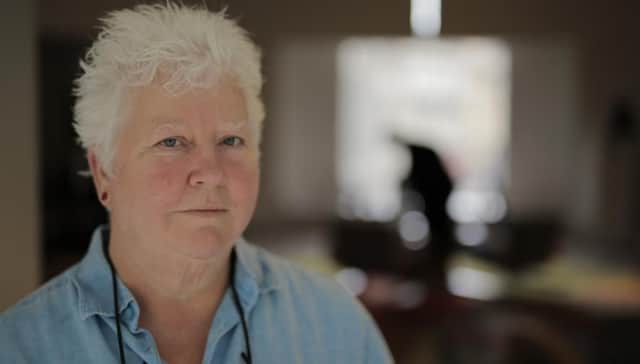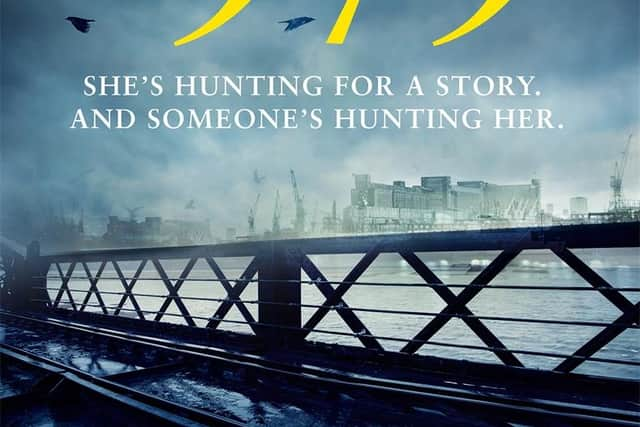Val McDermid: 'I'm not very good with authority'


It’s book launch No 35 for Val McDermid at the Edinburgh International Book Festival next week, and by now you might have thought she’d be a wee bit blasé about the whole business. Not a bit of it. She’s more anxious about the new book than any she’s written for almost 30 years.
Why? “First, it’s a big concept. Second, it’s the first new series that I’ve started knowing that it’s going to be a new series since I wrote my first Kate Brannigan book (Dead Beat, 1992). When I wrote my first Tony Hill/Carol Jordan novel (the series adapted for TV as Wire in the Blood) I thought that was going to be a standalone novel too, and it was the same when I wrote my first Karen Pirie (The Distant Echo, 2009; a six-hour adaptation has just been commissioned by ITV). So it’s been quite daunting sitting down writing something that I know is going to be a series and I’m more anxious about it than anything I have written for a long time.”
The new book is called 1979, after the year in which it is set. And the ‘big concept’ is that next year she’ll be back with 1989, and so on right up to 2019 - each book starring her new central character, journalist Allie Burns, each book charting how Scotland itself has changed - and not just the media, social attitudes, politics too. And, of course, crime.


“When you start a new series, the central character has to be appealing to you, and in turn you have to sow enough seeds in the first book to develop in further instalments. I wanted Allie to be tough enough to survive in journalism, although she may not always remain a journalist, and come out still standing. I wanted her to be gallus, but also have vulnerabilities.”
It won’t be the first time McDermid has chosen a female journalist as her central protagonist, and she was working as one herself when she wrote her first novel, Report for Murder, in 1987. Its heroine, Lindsay Gordon, then had her own series and McDermid worked on the second and third books in it before quitting journalism to write full-time. So who is more like her - Lindsay or Allie? “Lindsay is more brash, Allie more thoughtful. Neither are really like me, although obviously we have some of the same characteristics. The writer NJ Cooper has a good phrase about this - ‘less than you think and more than I believe.’”
Like her creator, Allie Burns is a working-class feminist Fifer who went to Oxbridge, and worked one a thinly disguised Daily Record as the 1970s ended. That underlay of real-life experience matters: 1979 reeks of inky, Life on Mars-style authenticity, right down to off-the-scale sexist attitudes to women reporters. Examples abound in the novel, though I prefer one McDermid mentions one from real life: when she asked her boss to hire a talented woman from another paper, he looked at her with increduliInty. “But we’ve already got a woman!” he said.
“I went into journalism,” she says, “because I foolishly thought we could change things. I’m not very good with hierarchy and authority and I get bored very quickly, so it seemed to be the only thing that would suit me. But I grew up in a household that took the Record and I believed that working people should have newspapers that were informed, entertaining, and did investigative journalism too.
“Of course, I couldn’t change how newspapers work, or stop the dive to the common denominator and the obsession with soap stars. When I was in Manchester [where she moved in 1979 for a job on the People] I remember sitting outside the door of a Coronation Street star at six o’clock in the morning waiting to see who came out, and thinking, ‘This is no way to earn a living.’” Looking round at colleagues 20 years older, she realised that she didn’t want to end up like them, but how could she avoid it? Certainly there was no escape tunnel via the quality press: as Allie Burns herself is told, “Once a tabloid hack, always a tabloid hack.”
The contrast between McDermid then and now is amazing. Instead of being stymied, she is positively flourishing. Just look at what she does as well as being Queen of Crime: frontwoman of the Funlovin’ Crime Writers, editor (with her partner Jo Sharp) of book of ideas for a better Scotland, writer of graphic novel out this month (see panel). Then there’s her commitment to the Harrogate Crime Festival (which she co-founded), the visiting professorship in New Zealand, countless appearances on radio and TV, the lockdown Cooking the Books videos, and so, so much more.
She says she’s worried about launching her new book, but there’s no need. 1979 is a fast-paced triple whammy of a thriller, with all three plots, each credible, running simultaneously. It uses all the crime writing skills she has honed over the years, and adds something else - a pin-sharp portrait of tabloid journalism in its messy, misogynistic 1970s heyday. AIlie Burns is off to a flying start, and well worth following down the decades.
1979, by Val McDermid, is published by Little, Brown, price £20. Val McDermid will be talking about it at the Edinburgh International Book Festival on Thursday 19 August at 2:30pm. www.edbookfest.co.uk
Graphic novels at EIBF, from Alison Bechdel to Val McDermid
With her angular haircut and glasses, American cartoonist and lesbian icon Alison Bechdel likes to joke that she’s so easy to draw that she’s almost a cartoon anyway. But what lights up her latest graphic memoir, The Secret to Superhuman Strength (Vintage, £16.99), is her search for what drives her lifelong passion for exercise. Whatever that is - mortality, addiction, self-sabotage, endorphin highs - is surely so elusive and invisible that you’d have thought a graphic artist would have a hard time getting it down on paper.
If you think that, though, you’ve clearly not read either of Bechdel’s previous best-selling graphic memoirs, the first of which, Fun Home, has already been turned into a multi-award-winning Broadway musical. (It is also in the process of being made into a film starring Jake Gyllenhaal as Bechdel’s gay dad, who ran a small Pennsylvanian funeral home before committing suicide in 1980.)
Although dutifully retracing all the various exercise fads that have obsessed her since then, Bechdel’s new book is really about a search for enlightenment and self-knowledge that ropes in Kerouac, Emerson, Wordsworth and the Buddha along with lorryloads of self-mockery in a multi-layered book that is both wildly witty and deeply wise.
Line of Duty writer Jed Mercurio is one of those people who already seem to have led three completely different lives. Not only has he been a doctor, but he’s flown jets too, and has always been fascinated by crash landings. There’s one in Sleeper (Scribner UK, £16.99), the graphic novel he has co-written with actor, writer and director Prasanna Puwanarajah (a fellow doctor and sci-fi nut), when in 2378 a biologically enhanced robot lawman crash-lands on Titan, the second-largest moon of Saturn, after a mysterious explosion in space.
This retro-futurist story, hand-inked by the curiously-named Valencia-based graphic artist Coke Navarro, was developed as a graphic novel after being turned down as a TV drama and aims to take the Western into an era when deep-space travel is a reality and Titan has become strategically important as an energy source. In his search to find out what caused the deadly explosion, robot lawman DS-5 has some advantages, but he was due to be decommissioned, and his powers are fading fast ... They will be even weaker in subsequent books, as he finds out more about his own past and the dark, starry world he’s landed in, but it’s an impressive debut.
Then again, so is Resistance (Wellcome Collection, £18.99), stylishly illustrated by American graphic novelist Kathryn Briggs and based on a three-part dystopian radio drama written by Val McDermid. In it, a mystery bug makes scores of people attending a Northumberland rock festival fall ill. Worse still, the antibiotics they’re given no longer seem to work. The plague spreads, mutates, more and more people die, and there doesn’t seem to be anything that can stop it before it kills not just millions, but billions of us.
The shocking thing about all of this, the then Chief Medical Officer Sally Davies told McDermid, is that this scenario is entirely plausible. “No new antibiotics have been developed for about 40 years and we don’t even completely understand how penicillin works,” says McDermid. “So it is likely to happen in the foreseeable future. The plague is coming, and we will not have the treatment for it as we have broken down our last line of defence.”
Alison Bechdel: Monday 23 August, 2.30pm; Jed Mercurio & Prasanna Puwanarajah/Val McDermid, Monday 16 August, 8.30pm.
DAVID ROBINSON